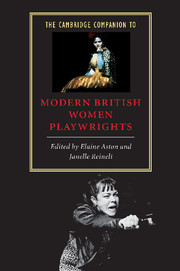Book contents
- Frontmatter
- 1 A century in view: from suffrage to the 1990s
- Part I Retrospectives
- Part II National tensions and intersections
- Part III The question of the canon
- Part IV The subject of identity
- Editors’ note
- 13 Small island people: black British women playwrights
- 14 Writing outside the mainstream
- 15 Lesbian performance in the transnational arena
- Index
Editors’ note
from Part IV - The subject of identity
Published online by Cambridge University Press: 28 May 2006
- Frontmatter
- 1 A century in view: from suffrage to the 1990s
- Part I Retrospectives
- Part II National tensions and intersections
- Part III The question of the canon
- Part IV The subject of identity
- Editors’ note
- 13 Small island people: black British women playwrights
- 14 Writing outside the mainstream
- 15 Lesbian performance in the transnational arena
- Index
Summary
Editors’ note
In this fourth and final section of the volume we bring together three chapters which indicate some of the multiple concerns and directions of women’s writing for theatre at the close of the 1990s. For these contributions, 'The subject of identity' seems an appropriate title because it suggests the way questions of identity continue to dominate women’s writing and further indexes the postmodern emphasis on the problematic of identity: its limitations as a concept, its fluctuating and elusive formations and re-formations, and its dispersal within contemporary hybrid, nomadic, cyber experience. While the second section on 'National tensions and intersections' explored the limitations of the concept of 'British' in the light of shifting notions of location and place, here we take up the limitations of the concepts of self, home, and political certainty in the situation of contemporary writers as subjects and as subject.
Much of women’s writing as discussed in this volume has been anchored in what is called 'identity politics'. Although we have charted historical shifts from an all-inclusive definition of woman to a carefully parsed articulation of difference among categories of women organised by race, class, sexuality, nationality, and sometimes religion, these identifications have also been surpassed or, to be less reductive and linear, interwoven and complicated by the questioning of subjectivity itself, its formations, positions, and articulations with other simultaneous ones. One of the perplexing issues for late 1990s feminism is the relevance of a claim to a political and artistic voice based on gender in light of the instability and inadequacy of any formal content for such an identity.
- Type
- Chapter
- Information
- The Cambridge Companion to Modern British Women Playwrights , pp. 214 - 216Publisher: Cambridge University PressPrint publication year: 2000

